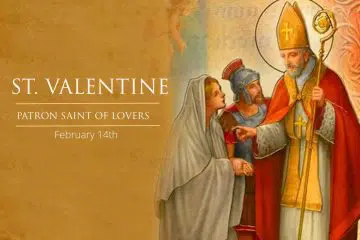The Two Daughters of Hope: Anger and Courage

Hope is a funny thing. Most people think of it like a wish…
“I hope the traffic isn’t bad.” “I hope the Bengals win.”
“I hope it doesn’t rain.”
But real Christian hope isn’t a feeling or a wish. It’s a conviction.
St. Augustine once said that hope has two beautiful daughters: anger and courage. Now, anger isn’t the most beautiful sounding of emotions, so it’s important to understand that St. Augustine used anger in this case more like we would think of zeal: a holy anger at the way things are and courage to make sure they don’t stay that way. I know, I know … that’s not the kind of quote you’ll find printed on a Christmas mug at the tree farm gift shop. But it might be the most Advent thing ever said.
Because, Advent is not about waiting around with our hands folded. And it’s not about the hustle and bustle in preparation for Christmas morning either. It’s about living in the tension between what has been fulfilled in Christ and what is still being fulfilled in us.
In the Old Testament, the Hebrew word for hope, qavah, literally means “to wait in tension.” The word makes me think of how my wife and I felt in those last few days before our first son was born—eight days past his due date! Israel waited that way for the Messiah. It was an aching, tension-filled longing. That’s the hope of the prophets, the psalms, a people, and a nation who trusted even when they couldn’t see.
Then, in Galatians 4:4, St. Paul tells us, “But when the fullness of time had come, God sent his Son, born of a woman, born under the law.” In the fullness of time. St. Paul uses the word pleroma. It’s not just that the waiting was over—the promise was fulfilled.
And yet, the story of salvation isn’t over.
So, we find ourselves living in this strange middle place.
The Messiah has come, yet the world is still groaning for the full fruits of redemption. Unlike the hope of the Old Testament—qavah—where we were waiting for fulfillment, we find in the New Testament the Greek word for hope: elpis, meaning a confident expectation rooted in something that has already begun.
A confident expectation. Not a wish. That’s the kind of hope that stirs something in us. It makes you restless. It gives birth to anger and courage.
Anger, because we see the brokenness and can’t pretend it’s fine.
Courage, because we believe God is already at work healing it… and He’s inviting us to help.
When a youth minister keeps showing up to minister to kids in an increasingly post-Christian world, that’s hope.
When a dad keeps praying for the son who’s wandered, that’s hope.
When a parish keeps the lights on and the doors open even when attendance is down, that’s hope.
It’s not passive waiting. It’s active anticipation. That’s the Christian difference.
Secular hope crosses its fingers like a kid hoping to get a new video game for Christmas. Theological hope rolls up its sleeves, knowing we have a God who keeps His promises.
Advent is an incredible reminder of what will be, not what could be.
So, don’t be afraid to shine your light this Advent in a world that desperately needs it. Let yourself feel a little holy anger. Let yourself feel courageous. That’s just hope doing its thing.
Because hope’s two daughters are still alive and well, and they look a lot like a people who are answering Christ’s call in a world that desperately needs Him. ✣
 Dominick Albano is a passionately Catholic husband and father of four boys. He has been writing, speaking, and leading Catholic retreats for more than 20 years. He is the co-founder of the National Society for Priestly Vocations.
Dominick Albano is a passionately Catholic husband and father of four boys. He has been writing, speaking, and leading Catholic retreats for more than 20 years. He is the co-founder of the National Society for Priestly Vocations.
This article appeared in the December 2025 edition of The Catholic Telegraph Magazine. For your complimentary subscription, click here.













